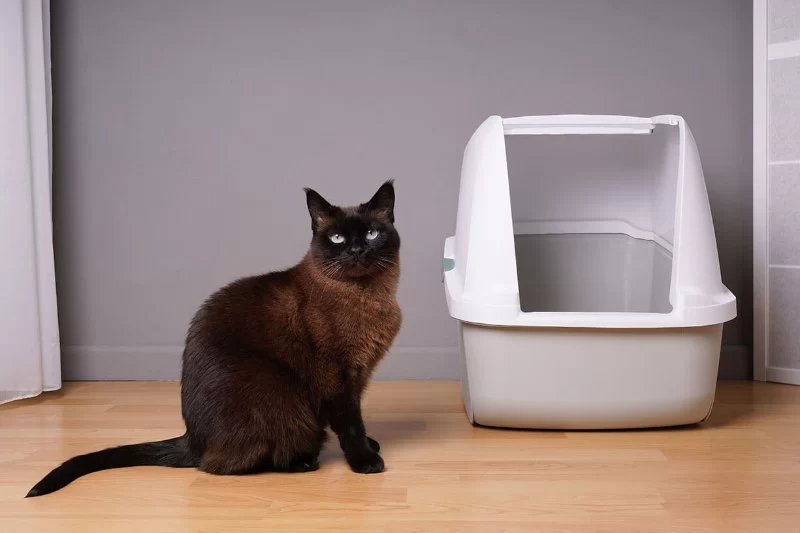- understanding-why-your-cat-is-avoiding-the-litter-box
- medical-conditions-you-shouldnt-overlook
- behavioral-triggers-and-environmental-factors
- how-to-respond-and-restore-good-habits
- real-life-case-insights-from-vet-practice
1. Understanding Why Your Cat Is Avoiding the Litter Box
When your cat starts peeing outside the litter box, it can feel frustrating—but this behavior is more than a nuisance. It’s often a clear signal that something deeper is wrong. Cats are creatures of routine and cleanliness, so eliminating inappropriately usually means they’re stressed, uncomfortable, or unwell.
The keyword question pet owners ask is: What to do if your cat is peeing outside the litter box? The first step is not punishment—but investigation. Think of your cat’s behavior as a cry for help, not an act of rebellion.
According to feline behavior experts at Hidden Brook Veterinary, inappropriate urination is one of the most common behavioral complaints among cat owners—and it’s also one of the most solvable when properly understood.
2. Medical Conditions You Shouldn’t Overlook
Before assuming behavioral issues, always rule out medical causes first. Urinary tract infections (UTIs), bladder stones, kidney disease, and feline lower urinary tract disease (FLUTD) are top culprits. These conditions can cause painful urination, which your cat may start associating with the litter box, prompting them to avoid it altogether.
One client at Hidden Brook Veterinary brought in a normally well-behaved tabby who had started urinating on the laundry room floor. Bloodwork revealed early kidney dysfunction—something that would have been missed without this behavioral red flag.
If your cat is peeing frequently, crying when using the litter box, or licking their genital area excessively, don’t wait. Bring them to a vet immediately. A simple urinalysis or ultrasound can be life-saving.
3. Behavioral Triggers and Environmental Factors
Once medical reasons are ruled out, turn your focus to the environment. Cats are sensitive to change—new furniture, unfamiliar guests, a baby in the house, or even different types of litter can trigger anxiety.
Litter box hygiene is also a major factor. Would you want to use a dirty toilet every day? Probably not—and your cat doesn’t either. The rule of thumb is one box per cat, plus one extra. The boxes should be scooped daily, and fully cleaned weekly. Covered litter boxes might seem tidier to humans but can feel confining and smelly to a cat.
Additionally, location matters. Loud laundry rooms, basements with unpredictable noises, or high-traffic hallways can discourage use. Try placing a second litter box in a quiet, safe space and observe if behavior improves.
Hidden Brook Veterinary often recommends using calming pheromone diffusers and unscented, clumping litter to reduce stress and boost compliance. They also provide home assessments for persistent cases where environmental adjustments are key.
4. How to Respond and Restore Good Habits
Never yell, spray, or punish your cat for peeing outside the litter box. Negative reinforcement only increases stress and often worsens the behavior. Instead, clean the soiled area thoroughly with an enzymatic cleaner to remove all traces of odor—cats are likely to return to the same spot if they smell urine.
Provide positive reinforcement when your cat uses the litter box correctly. Treats, praise, or gentle petting can go a long way in building new habits. Some cats even benefit from litter box retraining—confined to a single room with their litter box and food until they’ve re-established consistent use.
It’s also helpful to track patterns. Is it always near windows? It could be a territorial issue. Is it only on soft laundry? That may point to a texture preference. Documenting behavior can provide critical insights during a veterinary consultation.
For long-term improvement, Hidden Brook Veterinary offers behavior consultations and customized training plans for cats with chronic litter box avoidance.
5. Real-Life Case Insights from Vet Practice
A recent case at Hidden Brook Veterinary involved a three-year-old rescue cat named Luna, who began peeing on the owner's couch shortly after a new dog was adopted. Medical tests came back normal, but stress levels were clearly high. By creating a dog-free zone and using a pheromone diffuser in Luna’s sleeping area, the behavior stopped within a week.
Another older cat named Mr. Biscuit began avoiding the litter box and urinating on tile. A wellness exam revealed early signs of diabetes—a condition the owner was completely unaware of. With insulin and a modified diet, the inappropriate peeing disappeared.
These examples show that whether the cause is physical, emotional, or environmental, every litter box issue is a puzzle worth solving. Addressing the root cause early can protect your cat’s health—and save your floors, furniture, and sanity.
Need support for your cat’s behavioral or medical care? Hidden Brook Veterinary provides comprehensive feline services, from diagnostics to behavioral counseling, to help your pet live a healthier, happier life.












